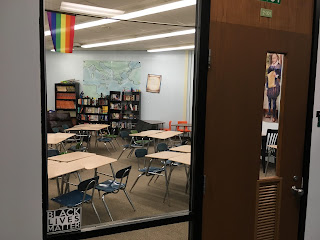Learning Targets and Daily Work Logs

I have been working with the concept of our daily work log for a while now, but I was not implementing it in a way that was truly beneficial. My first iteration asked students to list what they planned to accomplish in a given class period (based on my mini-lesson and assignments). Too often, there wasn’t enough to warrant a list, or teaching how to break down a task into smaller parts was more time-consuming than I had planned (such as breaking down the parts of planning and drafting an analysis paragraph). Also, I was more concerned with working one-on-one during workshop rather than critiquing the work log. Now, I have fine-tuned that process a bit more. I create a Google Doc that I share with all students, and on it, I include the chart above (with as many dates as I estimate a unit of study will take. Then, I create a column for daily reading reflection, another for our daily learning targets, another for a quick check on if students are “on-target,” and a final ...



